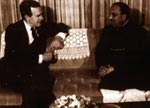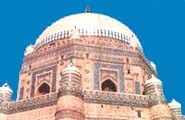|
Jan 1 Engineering Research Laboratories,
Kahuta, renamed Dr. Abdul Qadeer Khan Research Laboratories
Jan 16 Asiavision, a regional news exchange
for electronic media, starts operating with Pakistan as a member
Jan 10 Benazir Bhutto leaves for Geneva to receive medical
treatment, ending three years under house arrest
Jan 31 Student organisations banned in Islamabad
Mar 21 Zia announces 10-year extension of quota system
to appease disgruntled population of interior Sindh
Jun Finance Minister Mahbubul Haq launches drive to attract
'black' money in controversial 'Whitener Bond' scheme
Jul 24 'Qisas and Diyat Ordinance' promulgated
amid protests from human rights activists
Aug 13 Zia announces Nizam-e-Salat (system for
regulating prayers)
Oct Foreign ministers of Pakistan, Iran, Turkey agree
to launch ECO
Nov 4 Military speedy court passes death sentence on PPP
activist Nasir Baloch for involvement in Kabul hijacking (Mar 1981)
|
Obituary
Faiz Ahmad Faiz: poet, political activist
Yousuf Kamran: poet
Aslam Parvaiz: actor
Khurshid Anwer: music composer
Maulana Shafi Okarvi:
religious orator
|
|
Plot revealed
Jan 2 Dissident military personnel receiving smuggled
ammunition from India in bid to oust Zia regime apprehended by Inter-Services
intelligence in top secret 'Operation Galaxy.' Seth Abid acts as link
for smuggled ammunition, believed to have double-crossed India by tipping
off the government; exiled PPP leader Ghulam Mustafa Khar also implicated
Clampdown on student unions
February 9 The government has promulgated a martial
law ordinance banning all student organisations throughout the country.
Student leaders have been arrested, accused by the government of creating
discipline problems in educational institutions and for being involved
in political agitation.
MQM launched
March 18 Following the ban on student organisations,
former office bearers of the All-Pakistan Mohajir Student Organisation
have launched the Mohajir Quami Movement in Karachi. Founder Altaf Husain
is declared the Quaid-e-Tehrik; Azeem Ahmad Tariq is chairman
The gulf boom
During the 1970s and 1980s, large-scale migration to the
Middle East dramatically alters the character of development in Pakistan
and contributes to fundamental changes in the country's economy and society.
About two million Pakistanis -- representing at least ten per cent of
the country's households and more than seventy per cent of its labour
force -- work in the Middle East. Remittances from these workers approach
2.5 billion dollars, far overshadowing foreign aid receipts and almost
equaling the amount earned by Pakistani exports. The most visible impact
of these remittances is the rapid increase in consumer goods and housing
improvements. Less visibly, employment and investment patterns are affected
in a variety of ways. (Contributed by Talat Aslam)
Cold War
April As Indian forces move stealthily into the Northern
Areas of Pakistan, the two armies have become embroiled in a gruelling
conflict on the Siachen Glacier, the largest glacier outside the Arctic
Circle, and the highest battleground in recorded history.
 Bush
visits Pakistan Bush
visits Pakistan
May US Vice-President George Bush is probably the
highest dignitary to follow the current US trend of visiting Pakistan.
He was greeted by cheering Afghan tribals near the Khyber Pass and he
told them that their indomitable spirit of freedom has earned the admiration
of free men everywhere.
Referendum
December 19 A referendum is held to determine the
people's will. The question: do the people of Pakistan endorse the process
initiated by General Zia to bring all laws in conformity with the injunctions
of Islam, as laid down in the Holy Quran and Sunnah, and do they support
the continuation of that process for the smooth and orderly transfer of
power to the elected representatives of the people?
A positive vote will provide General Zia with a mandate
to remain president for the next 5 years. The MRD appeals for a boycott
of the proceedings, while the Jamaat-e-Islami supports the move.
Zia to rule till 1990
Official results of the referendum claim a 62.12 per cent
turnout in the referendum, with 97.71 per cent "positive" votes
cast. However, opponents claim that the turnout was barely 5 per cent.
Nevertheless, General Zia's presidency has been secured -- at least until
1990.
|
 |
|
The banned title
|
Banned!
Jinnah of Pakistan by Stanley Wolpert, generally
acclaimed to be the best biography of the Quaid-i-Azam so far, has been
banned in Pakistan as it doesn't conform to the present regime's portrayal
of the Founder of the Nation. Earlier, excerpts from the 11 August Speech
of Jinnah were also censored from a newspaper by the watchdogs of Ziaul
Haq. The officially printed collection of the Quaid's speeches still omits
several passages from that speech.
Monthly Herald gets an uplift and breaks with the
past to establish itself as a news magazine.
 Aga
Khan Award for Architecture Aga
Khan Award for Architecture
The restoration of the Shah Rukn-e-Alam Mausoleum receives
the prestigious Aga Khan Award for Architecture.
Picture imperfect?
Lahore painter Iqbal Hussain's show at the Al-Hamra Arts
Council was cancelled only hours before the opening, apparently because
it contained portraits of women from Lahore's infamous Heera Mandi, women
without dupattas and a pregnant woman.
Sound of Sindh
Sindh nationalism finds a new avenue of expression as
the Urs of Shah Abdul Latif becomes a rallying point. Old masters from
Faqir Abdul Ghafoor to Hussain Bakhsh Khadim, Mohammad Yusuf and Allan
Faqir share the stage with the impassioned younger generation led by Abida
Parveen.
Los Angeles Olympics
August 11. Pakistan secures Olympic hockey gold,
after 16 years, under Manzoor Junior
Gandasa revolution
The rise of the video, and growing censorship, among other
factors, slowly kill off the Urdu film industry. Punjabi cinema comes
to dominate the large screen, boosted by the growth of Punjab's smaller
towns and large-scale rural-urban migraion. Violence, rather than sex,
becomes the driving force of movies as middle class audiences drift away
from increasingly dilapidated and rowdy cinemas. The icons of this new
cinema are Sultan Rahi and his statuesque counterpart in countless films,
Anjuman. At the same time, soft core pornography becomes the forte of
Pushto films, courtesy Musarrat Shaheen, Chakori and powerful politicians
whose cinemas are able to get around the censor's sharp scissors. (Contributed
by Talat Aslam)
 Hero
worship Hero
worship
This was the year of Waheed Murad, the chocolate- cream
hero who died last year of alcohol abuse, stomach cancer and a broken
heart. The last 12 months have seen an unprecedented revival of his films
on the big screen, some of which are showing to packed audiences, forcing
the director of his unfinished Hero to complete the film for release early
next year with a number of "cheat" shots.
|
Songs
remembered
Mera laung gawacha (PTV; Mussarat Nazeer)
Zara chehra to dikhao (cassette, Young Tarang) |
|
|




 Aga
Khan Award for Architecture
Aga
Khan Award for Architecture Hero
worship
Hero
worship